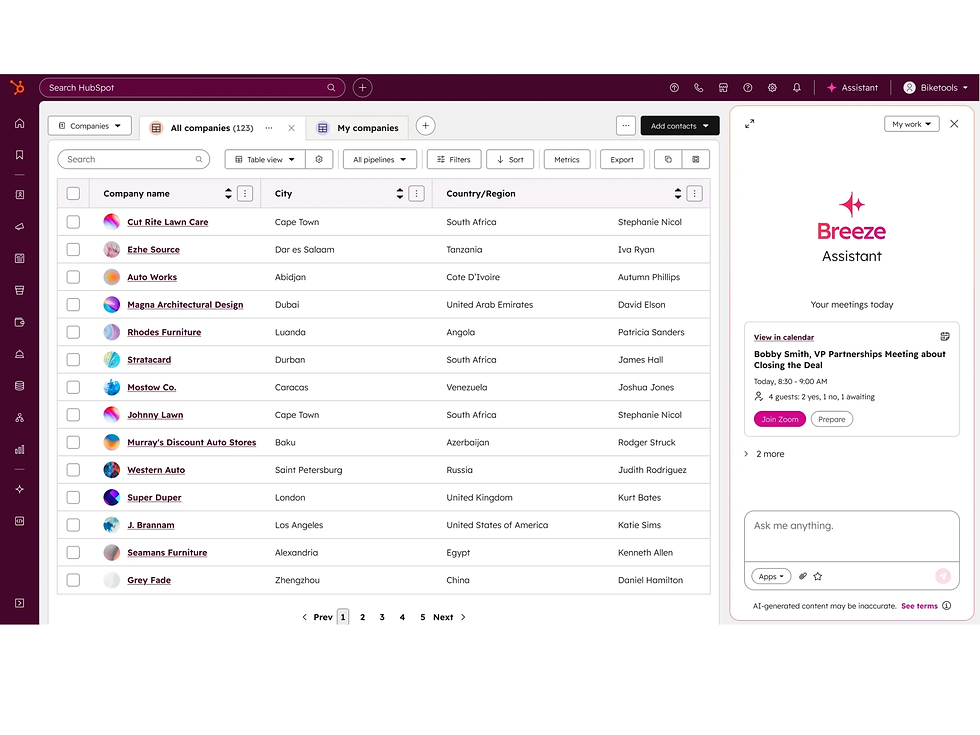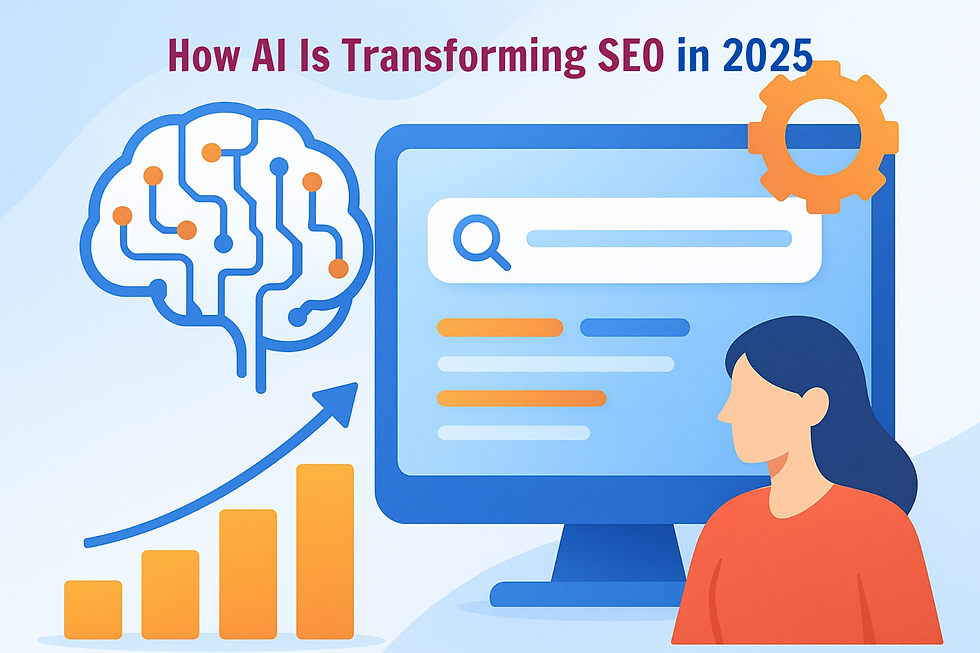From Data to Decisions: How AI Transforms Business Strategy in 2025 and Beyond
- Nov 4, 2025
- 5 min read
Discover how AI turns raw business data into powerful, insight-driven strategic decisions.
In the past, strategic business decisions were guided by instinct, experience, and spreadsheets. Today, artificial intelligence (AI) has rewritten that playbook. From predicting market trends to personalizing customer experiences, AI is empowering businesses to move from data to decisions faster, smarter, and more accurately than ever before.
What once took teams of analysts weeks to interpret can now be processed and visualized in real time. Companies like Amazon, Google, and Netflix already rely on AI to forecast demand, optimize operations, and refine customer engagement but the real shift in 2025 is how AI democratizes strategic decision-making for businesses of every size.
This article explores how AI transforms data into actionable strategy, examining the technologies behind it, real-world examples, and how your organization can adopt an AI-first approach to decision-making.
Understanding the AI Shift: From Intuition to Intelligence
AI in business is not just about automation; it’s about amplifying intelligence. Traditional analytics gave us insights from the past, AI goes further by predicting what’s next.
Machine learning (ML), natural language processing (NLP), and generative AI systems now enable organizations to interpret vast datasets, identify patterns, and recommend strategic actions automatically. Instead of reacting to performance metrics, leaders can proactively design strategies guided by predictive insights.
Key capabilities driving this transformation include:
Predictive Analytics: Forecasting trends and behaviors based on past data.
Prescriptive Intelligence: Suggesting optimal actions to achieve desired outcomes.
Cognitive Automation: Automating decision processes that once required human judgment.
The result? Businesses are no longer just data-rich, they are decision-smart.
How AI Transforms Strategic Decision-Making
AI doesn’t replace human strategy, it enhances it. Let’s break down how organizations are using AI at every stage of decision-making:
Data Collection and Integration
AI tools can gather and unify data from multiple sources: CRM systems, social media, sales pipelines, and IoT sensors. Platforms like Snowflake, Databricks, or Google BigQuery use AI algorithms to clean, normalize, and prepare massive datasets for analysis. This ensures leaders always work with a single source of truth.
Pattern Recognition and Predictive Modeling
Once data is structured, AI models analyze historical performance to predict future outcomes. For example:
Retailers use AI to forecast seasonal demand and optimize inventory.
Finance teams employ AI-driven risk models to prevent fraud.
Healthcare companies use AI to anticipate patient needs and allocate resources.
The predictive layer transforms strategy from reactive to anticipatory.
Strategic Recommendation Engines
AI doesn’t stop at analysis, it suggests actions. Tools like Salesforce Einstein or IBM Watsonx provide prescriptive insights: “If you increase spending on Channel A by 10%, revenue could rise by 15%.” These models help executives simulate different strategic scenarios and choose the most profitable path.
Real-Time Decision Automation
In fast-moving industries like logistics, finance, or cybersecurity, AI can make decisions autonomously: rerouting shipments, adjusting stock portfolios, or blocking cyber threats. The speed of insight becomes a competitive edge.
How AI Enhances Each Stage of Strategic Decision-Making
Stage | Traditional Approach | AI-Powered Approach |
Data Gathering | Manual data collection, often siloed | Automated, unified, and real-time |
Analysis | Descriptive (what happened) | Predictive (what will happen) |
Decision-Making | Based on experience | Based on data-driven intelligence |
Execution | Human-triggered | Automated, continuous optimization |
Real-World Use Cases: AI Strategy in Action
Retail: Smarter Forecasting and Customer Insights
Companies like Zara and Walmart use AI to analyze purchasing data, optimize supply chains, and predict product demand. AI-driven pricing algorithms adjust prices dynamically to balance stock and maximize profit.
Finance: Risk Management and Fraud Detection
Banks deploy AI to detect anomalies in transaction data. Platforms such as FICO Falcon use deep learning to spot suspicious activity before losses occur, enabling quicker and more accurate responses.

Source: FICO Falcon
Healthcare: Predictive Care and Resource Allocation
AI helps hospitals predict patient inflow, manage staffing levels, and even identify at-risk patients before symptoms worsen. The result: better care outcomes and reduced operational strain.
Marketing: Personalized Customer Journeys
Tools like HubSpot AI and Adobe Sensei analyze customer behavior to automate content recommendations, optimize ad spend, and boost engagement. Marketers can now personalize campaigns at scale, something previously impossible with manual segmentation.

Source: HubSpot
Manufacturing: Predictive Maintenance and Efficiency
AI-powered systems forecast when machines will need maintenance, minimizing downtime and saving millions annually. This kind of operational foresight transforms efficiency into strategy.
The Strategic Value: Why AI Is a CEO’s Best Ally
AI doesn’t just make operations smoother, it transforms the strategic DNA of companies.
Enhanced Agility
AI allows leaders to pivot strategies based on real-time data rather than quarterly reports. It’s not about replacing the boardroom, it’s about making that room smarter.
Competitive Intelligence
AI can continuously monitor competitors, market sentiment, and consumer behavior. This enables faster, more informed decisions that anticipate, not react to market shifts.
Smarter Resource Allocation
Through AI-driven scenario modeling, businesses can identify which departments, markets, or products yield the highest ROI, optimizing both time and capital.
In short, AI transforms strategy from static planning into a living, adaptive system.
The Future Outlook: Where Business AI Is Headed
By 2030, analysts predict over 70% of business decisions will involve AI assistance in some form. But the real evolution isn’t just technological - it’s cultural.
Companies must move from “data adoption” to “AI fluency” - training teams to collaborate with AI systems, interpret their recommendations, and understand the ethical dimensions of automated strategy.
We’ll also see the rise of autonomous business ecosystems, where AI systems from different organizations exchange insights securely through federated data networks. Imagine supply chains that optimize themselves across entire industries.
In this future, the most successful organizations will be those that don’t just use AI, they think with AI.
FAQ: AI and Strategic Decision-Making
1. How does AI differ from traditional business intelligence (BI)?
Traditional BI analyzes historical data; AI predicts future outcomes and recommends next steps using machine learning and natural language models.
2. Can small businesses leverage AI for strategy?
Absolutely. Many cloud-based tools (like Google Vertex AI or Microsoft Copilot) now offer affordable, plug-and-play analytics solutions.
3. What are the biggest challenges in AI-driven strategy?
Data quality, privacy concerns, and over-reliance on automated recommendations remain key challenges. Human judgment must remain in the loop.
4. Which industries benefit most from AI strategy?
Finance, healthcare, retail, manufacturing, and marketing currently lead the way, but virtually all sectors are seeing transformation.
5. Will AI replace strategic managers?
Not likely. AI enhances human decision-making but cannot replace contextual understanding, creativity, and ethical judgment.
From Insights to Impact
AI is no longer a futuristic concept, it’s the invisible strategist behind today’s smartest companies. By transforming raw data into predictive insights and prescriptive actions, AI allows organizations to make decisions that are not only faster but fundamentally smarter.
Whether it’s optimizing supply chains, tailoring customer experiences, or forecasting financial performance, AI is redefining how businesses see, think, and act.
Both the technology and the mindset behind AI-driven strategy mark a new era: data isn’t just information, it’s intelligence in motion.
For more insights and comparisons on how AI is reshaping industries, explore our AI Knowledge Hub - your gateway to the future of intelligent business.
.png)



Comments